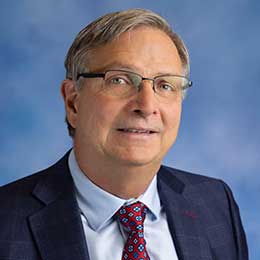
Robert Hyzy, MD, FCCP

Robert Hyzy, MD, FCCP

Robert Hyzy, MD, FCCP
CHEST Foundation grants often fund new studies or projects—but they can also help established initiatives extend their reach. Twelve years ago, Robert Hyzy, MD, FCCP, received a foundation grant that helped propel his organization’s free clinic into a more functional facility with a greater capacity to serve patients.
Dr. Hyzy is the Medical Director of the Critical Care Medicine Unit and Co-Chair of the Critical Care Committee at the University of Michigan Hospital in Ann Arbor, Michigan. He also serves as the Medical Director for Amazon Promise, a nonprofit organization that provides medical care to remote communities in the Upper Amazon Basin of northeastern Peru.
In 2010, Dr. Hyzy received a CHEST Foundation grant to fund plumbing improvements for an Amazon Promise free clinic in Belén, an extremely poor community near the city of Iquitos. To accommodate seasonal flooding that occurs from nearby rivers, residents live in wooden shacks that float on the water or are built on stilts.
“Amazon Promise has a clinic on stilts in the air with a small waiting room,” says Dr. Hyzy. “There’s no running water, so that’s a problem. And we built this clinic, but we really had no plumbing of any sort.”

Amazon Promise free clinic in Belén
His proposal to the CHEST Foundation requested funding for a water purification system, composting toilet, and a shower in the back of the facility. When they received the grant, Amazon Promise worked with the organization Engineers Without Borders to install the components, which took less than a week to complete.
The grant helped propel the clinic into a more fully functional center for their local Peruvian staff, American staff, and teams of University of Michigan medical students and residents who travel to Belén every year with Dr. Hyzy.
“It made a big difference for us to be able to use our clinic more fully [and] more comfortably…” he said. “It’s been roughly 10 years, and that equipment is still in use today.”
The improvements have been particularly beneficial during his annual trips with medical residents, which have helped increase the clinic’s capacity.
“I was able to parlay this into a force multiplier by bringing down students and residents. I could only see so many patients myself, but by bringing down people…we could see so many more patients,” Dr. Hyzy said.
Since they made the system improvements, Dr. Hyzy and his teams have served thousands of people at the clinic over the course of 10 trips. During each visit to Belén, they typically see 200 to 250 people a day for 1 or 2 days. They’re tentatively planning their next trip for 2022 depending on the state of the COVID-19 pandemic. Dr. Hyzy’s clinical work in Belén focuses on deworming children and providing them with antiparasitic medications and multivitamins.
When Dr. Hyzy reflected on the opportunities he’s had to serve in the clinic, he said perhaps the most meaningful part has been connecting with patients.
“In a way, the greatest impact we have is in people who are largely forgotten, knowing they’re not forgotten,” he said. “The third world means nothing less than university-based medical critical care.”
Support initiatives like Amazon Promise by donating to CHEST. If you’re interested in applying for a grant, explore community service and research grant opportunities.